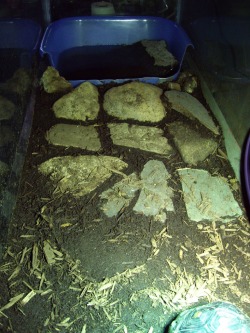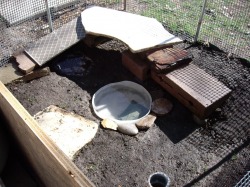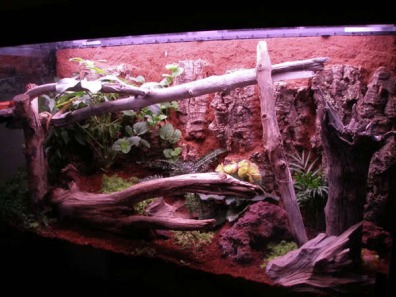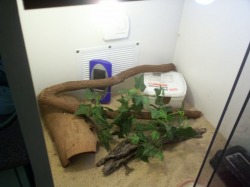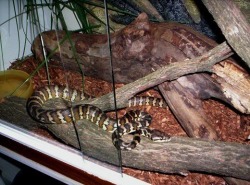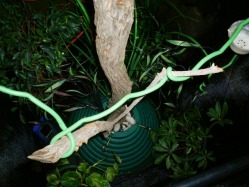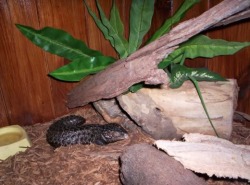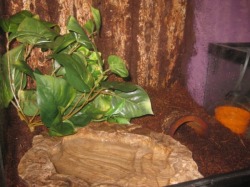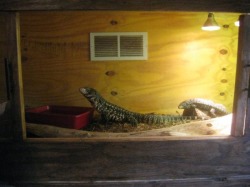PLEASE NOTE
The information on the BambooZoo site is as much as 10 years old and in the hobby much has been learned. Though, I believe there is merit in keeping the site open. There are many controversial issues presented in these pages. Please view BambooZoo as a starting point in your research.
These beings are as complicated as we are and deserve more than a basic 5 paragraph care sheet to maintain their health and well being.
My passion has changed. This is where I am today. Change the World.
THE HUSBANDRY VARIABLES
THE QUESTIONS:
Confused? Just too many differences in Caresheets and on forums? Don't know what way to go? My philosophy on this is you have to look at yourself and say who am I? What are my limitations? What are my goals, my time restrictions, my own personality, how fast will my life change around me, how stable is my environment?
The following questions were asked in a forum venue:
::slaps palm to forehead:: oi yoi yoi ....what a problem I caused! I have to work on my submission of questions plan of action!
Do you think this might be a right mind / left mind kind of separation....
creative minds vs. stat/math/analysis minds?
why have you chosen the route to take in your home?
What was involved in your decision making process?
Explain to me your reptile keeping philosophy?
What kind of commitment and organizational ability is needed to be successful within the style that you work in?
I am looking for 8 very well stated answers that can be added to the Bzoo.
I will ask for your personal approval to post each.
I can't give an answer to new people about the substrate issue but maybe we can give them the information that will decide their personal choices. I am going to post this at 4 forums. From each forum I will take 2 answers and link to the thread.
I almost don't feel that what husbandry technique we use, is as important as our ability to judge our reptiles ability to adapt to what we provide. Our ability to see what is needed.
Pat
::slaps palm to forehead:: oi yoi yoi ....what a problem I caused! I have to work on my submission of questions plan of action!
Do you think this might be a right mind / left mind kind of separation....
creative minds vs. stat/math/analysis minds?
why have you chosen the route to take in your home?
What was involved in your decision making process?
Explain to me your reptile keeping philosophy?
What kind of commitment and organizational ability is needed to be successful within the style that you work in?
I am looking for 8 very well stated answers that can be added to the Bzoo.
I will ask for your personal approval to post each.
I can't give an answer to new people about the substrate issue but maybe we can give them the information that will decide their personal choices. I am going to post this at 4 forums. From each forum I will take 2 answers and link to the thread.
I almost don't feel that what husbandry technique we use, is as important as our ability to judge our reptiles ability to adapt to what we provide. Our ability to see what is needed.
Pat
The Alberta Reptile and Amphibian Society
Main forum link:
http://www.albertareptilesociety.org/forum/index.php
The thread:
http://www.albertareptilesociety.org/forum/showthread.php?t=8047
ANSWER 1
Hi Pat, I just wanted to respond to questions posed in your thread. I might add that this is a welcome break from the usual banter on the forums...
creative minds vs. stat/math/analysis minds?
Cannot comment here, but for myself it's a bit of both left and right brain. I'd like to be more creative in the overall setup, but I'm forced to be as practical as possible. Quite simply, I dont have the time or the room or the money to do what is pictured in my head
why have you chosen the route to take in your home?
We are a working household, we had to strike a compromise between what was efficient in terms of the work involved on an often tight schedule. That being said, we still wanted to provide a modicum of natural environment for our fella (a red foot tortoise)
What was involved in your decision making process?
- securable, appropriate location within residence
- availability of space
- materials available
- ease of access (mom has arthritis and must be able to access the animal)
- ease of cleaning
- safety issues (small curious dogs)
- providing a reasonable environment for the animal without going broke
Similiar guidelines were followed when establishing an outdoor pen, with greater latitude for space requirments.
Explain to me your reptile keeping philosophy?
Based on what's realistic and achievable, factoring in care requirments and budget. Obviously, we arent going to have an indoor tortoise pen covering several square yards, as ideal as it may be for the animal. We focus moreso on the animal's dietary needs and it's basic requirments (humidity, uvb, heat requirments). Having a really fancy-schmancy setup is going to be an exercise in futility when keeping torts, as they arent especially aware of aesthetics. Essentially, the animal trashes the enclosure on a daily basis. Because the tortoise tank is dirt bearing, I use springtails and isopods as soil cyclers, thereby extending the service life of the substrate greatly.
What kind of commitment and organizational ability is needed to be successful within the style that you work in?
Relatively easy IMO. Commitment amounts to about an hour a day minimum, excluding "play time". A fairly loose and varied feeding schedule, but regimented bathing and water tub changes as tortoises can be somewhat filthy by our standards. One day on the weekend, I spend a couple hours cleaning the tank, being more meticulous than on a weekday. We also prepare food in advance for the animal, ingredients are selected with very high standards and mixed by us at home. In terms of organization, minimal time management is required. The tasks are reasonably simple and not especially strenuous, though often frustrating when the animal defecates in the enclosure. We're "training" the animal to defecate in the bathtub, as the feces is more easily dealt with
Untracked time spent with the animal includes as much free ranging as possible under the circumstances, and random interactions with the creature. __________________
This reply by Joe, a.k.a. non-invictus profundum.
Hi Pat, I just wanted to respond to questions posed in your thread. I might add that this is a welcome break from the usual banter on the forums...
creative minds vs. stat/math/analysis minds?
Cannot comment here, but for myself it's a bit of both left and right brain. I'd like to be more creative in the overall setup, but I'm forced to be as practical as possible. Quite simply, I dont have the time or the room or the money to do what is pictured in my head
why have you chosen the route to take in your home?
We are a working household, we had to strike a compromise between what was efficient in terms of the work involved on an often tight schedule. That being said, we still wanted to provide a modicum of natural environment for our fella (a red foot tortoise)
What was involved in your decision making process?
- securable, appropriate location within residence
- availability of space
- materials available
- ease of access (mom has arthritis and must be able to access the animal)
- ease of cleaning
- safety issues (small curious dogs)
- providing a reasonable environment for the animal without going broke
Similiar guidelines were followed when establishing an outdoor pen, with greater latitude for space requirments.
Explain to me your reptile keeping philosophy?
Based on what's realistic and achievable, factoring in care requirments and budget. Obviously, we arent going to have an indoor tortoise pen covering several square yards, as ideal as it may be for the animal. We focus moreso on the animal's dietary needs and it's basic requirments (humidity, uvb, heat requirments). Having a really fancy-schmancy setup is going to be an exercise in futility when keeping torts, as they arent especially aware of aesthetics. Essentially, the animal trashes the enclosure on a daily basis. Because the tortoise tank is dirt bearing, I use springtails and isopods as soil cyclers, thereby extending the service life of the substrate greatly.
What kind of commitment and organizational ability is needed to be successful within the style that you work in?
Relatively easy IMO. Commitment amounts to about an hour a day minimum, excluding "play time". A fairly loose and varied feeding schedule, but regimented bathing and water tub changes as tortoises can be somewhat filthy by our standards. One day on the weekend, I spend a couple hours cleaning the tank, being more meticulous than on a weekday. We also prepare food in advance for the animal, ingredients are selected with very high standards and mixed by us at home. In terms of organization, minimal time management is required. The tasks are reasonably simple and not especially strenuous, though often frustrating when the animal defecates in the enclosure. We're "training" the animal to defecate in the bathtub, as the feces is more easily dealt with
Untracked time spent with the animal includes as much free ranging as possible under the circumstances, and random interactions with the creature. __________________
This reply by Joe, a.k.a. non-invictus profundum.
ANSWER 2
Do you think this might be a right mind / left mind kind of separation....
creative minds vs. stat/math/analysis minds?
I tend to think not, but it's possible. I believe it has more to do with the animals needs, one's motivation, available time, space, and money.
why have you chosen the route to take in your home?
My preference lies with naturalistic type setups, but ultimately at some point day to day life factors in and compromise comes into play.
What was involved in your decision making process?
Primarily the animal's needs first. Are there special care requirements? What am I prepared to do to meet those needs, and can I realistically provide a natural type setup that will be easily sustained and maintained with the enclosure I am providing? Will it be better served with a more minimalistic or lab type setup?
Explain to me your reptile keeping philosophy?
To provide the utmost care while selfishly enjoying their interactions with their habitat and also my family and friends. I try to be on top of what their needs would be in nature, not just looking at the climate and geography, but the microhabitats they inhabit. I do my best to mimic those conditions either through naturalistic means or by recreating the conditions falsely. Usually there's overlap.
I offer the means for my animals to make choices. I feel they will know best what they need so I offer wide temperature gradients through warm spots & cool areas, areas for basking and areas for shelter, areas of humidity and areas to remain dry. I try to realistically offer larger enclosures so I can provide those different conditions.
What kind of commitment and organizational ability is needed to be successful within the style that you work in?
The commitment is a little more than the norm initially, but once set up it's usually less than an hour a day for maintenance & some interaction time. I find the more natural type seups with bioactive soil substrates take less organization once set up as they naturally cycle. It's a matter of keeping an eye on things and trying to notice odd behaviours or physical issues. The downfall would be that with more natural setups some potential problems might be harder to spot.
This answer provided by Chris, a.k.a. Spankenstyne. Below is one of Chris's vivariums.
Do you think this might be a right mind / left mind kind of separation....
creative minds vs. stat/math/analysis minds?
I tend to think not, but it's possible. I believe it has more to do with the animals needs, one's motivation, available time, space, and money.
why have you chosen the route to take in your home?
My preference lies with naturalistic type setups, but ultimately at some point day to day life factors in and compromise comes into play.
What was involved in your decision making process?
Primarily the animal's needs first. Are there special care requirements? What am I prepared to do to meet those needs, and can I realistically provide a natural type setup that will be easily sustained and maintained with the enclosure I am providing? Will it be better served with a more minimalistic or lab type setup?
Explain to me your reptile keeping philosophy?
To provide the utmost care while selfishly enjoying their interactions with their habitat and also my family and friends. I try to be on top of what their needs would be in nature, not just looking at the climate and geography, but the microhabitats they inhabit. I do my best to mimic those conditions either through naturalistic means or by recreating the conditions falsely. Usually there's overlap.
I offer the means for my animals to make choices. I feel they will know best what they need so I offer wide temperature gradients through warm spots & cool areas, areas for basking and areas for shelter, areas of humidity and areas to remain dry. I try to realistically offer larger enclosures so I can provide those different conditions.
What kind of commitment and organizational ability is needed to be successful within the style that you work in?
The commitment is a little more than the norm initially, but once set up it's usually less than an hour a day for maintenance & some interaction time. I find the more natural type seups with bioactive soil substrates take less organization once set up as they naturally cycle. It's a matter of keeping an eye on things and trying to notice odd behaviours or physical issues. The downfall would be that with more natural setups some potential problems might be harder to spot.
This answer provided by Chris, a.k.a. Spankenstyne. Below is one of Chris's vivariums.
REPTILE PLANET
THIS NEXT POST CAME THROUGH A FORUM THAT CHOSE TO DELETE THE THREAD. THEREFORE I WILL GUIDE YOU TO WRITER'S SITE.
"Ill have a go, though it may not be as eloquent as you are hoping, it,s early here and I need coffee
Assuming this refers to reptile keeping in a general sense?
"-Do you think this might be a right mind / left mind kind of separation?....
Perhaps, people are individuals after all. Creative thinking is definitely a bonus, and can bring together both intellectual and artistic satisfaction for the keeper, and contribute to the well being of the species concerned, in regards to ecological suitability and natural behaviors, and a propensity to breed readily in such conditions.
-Creative minds vs. stat/math/analysis minds?
For the reasons stated above, I think both are necessary for success. a sound scientific understanding of a specie/s natural ecology, should in my opinion, be the basis/foundation, for all husbandry choices. well meaning creativity alone can often end in disaster, likewise a purely sterile and scientific approach, leaves, im my humble opinion, much to be desired, in terms of the animal/s housed. Having all life requirements met in sterile lab surrounds, does not, happy animals make, especially non domestics like reptiles.
-Why have you chosen the route to take in your home?
I have always chosen a blend of both routes since I'm very much a big fan of nature. Displaying fauna in as naturalistic exhibit as possible, affords me the pleasure of natural beauty in my home while meeting my captives needs both for life sustenance and security of natural surrounds. It allows my animals to behave naturally, breed readily, while at the same time a balance is struck between this and ease of maintenance, since I own a few different species.
-What was involved in your decision making process?
First always, the physical and mental well being of my captives, whose quality of life depends entirely on me. Secondly a sound understanding of the natural ecology of any species I wish to keep, provides the answers to my artistic endevours, since one must meet the other. Needs first, looks second. Other than this, there is no real set decision making during the learning process for a new species, beyond a certain amount of research into its physical requirements.
What works for one species, is often no use to another, or unsuitable despite looking good, so you must be willing to accept artistic defeat at times for the animals benefit. Trial and error is to a degree, a large part of the learning curve.
Its often said of reptile keeping, 'there is no one right way to do things, just lots of wrong ways.
If you ask ten different keepers about a specific husbandry point for a specific species, you often get ten different answers. This makes the ability to think for yourself and common sense, along with a sound knowledge of a species natural ecology, a must, for anyone new to reptiles.
-Explain to me your reptile keeping philosophy?
Animal/s first, Keeper/s second.
Like any endevour, passion alone is not enough. Im a passionate builder, but you wouldn't trust me to build a bird feeder!
Willingness to learn, and understand what you undertake is vital to success, and while skill is acquired along the way, passion must encompass the will to succeed at your endeavour, regardless the difficulty or time required to achieve. With anything involving living things, these attributes cannot be understated. Understanding the needs of a living creature, particularly one so different from us, MUST be the foundation of any keeping endeavour, be that a bearded dragon or chameleon.
Base your husbandry and environment on species specific knowledge and worry about aesthetics later, and you wont go far wrong.
-What kind of commitment and organizational ability is needed to be successful within the style that you work in?
This will depend largely on the level of commitment and the reason for it to begin with. A large commercial enterprise is a world away from the average keeper.
As with anything, the scope of your endeavour should not be beyond your time and resources, nor your passion for it.
Personally, I keep a number of species, all are family pets, and while the temptation is great to expand, My time and resources are limited. If I cannot maintain happy clean healthy animals, My philosophy is that I have too many.
Most are lizard species and while each is different, all require much more time and organization than my snakes do. Regular cleaning, feeding, observation are daily routine, maintenance of environment and equipment also.
Fortunately, I am afforded the free time to make this possible. My animals breed naturally and produce healthy offspring, which I consider a strong indicator of success.
Assuming this refers to reptile keeping in a general sense?
"-Do you think this might be a right mind / left mind kind of separation?....
Perhaps, people are individuals after all. Creative thinking is definitely a bonus, and can bring together both intellectual and artistic satisfaction for the keeper, and contribute to the well being of the species concerned, in regards to ecological suitability and natural behaviors, and a propensity to breed readily in such conditions.
-Creative minds vs. stat/math/analysis minds?
For the reasons stated above, I think both are necessary for success. a sound scientific understanding of a specie/s natural ecology, should in my opinion, be the basis/foundation, for all husbandry choices. well meaning creativity alone can often end in disaster, likewise a purely sterile and scientific approach, leaves, im my humble opinion, much to be desired, in terms of the animal/s housed. Having all life requirements met in sterile lab surrounds, does not, happy animals make, especially non domestics like reptiles.
-Why have you chosen the route to take in your home?
I have always chosen a blend of both routes since I'm very much a big fan of nature. Displaying fauna in as naturalistic exhibit as possible, affords me the pleasure of natural beauty in my home while meeting my captives needs both for life sustenance and security of natural surrounds. It allows my animals to behave naturally, breed readily, while at the same time a balance is struck between this and ease of maintenance, since I own a few different species.
-What was involved in your decision making process?
First always, the physical and mental well being of my captives, whose quality of life depends entirely on me. Secondly a sound understanding of the natural ecology of any species I wish to keep, provides the answers to my artistic endevours, since one must meet the other. Needs first, looks second. Other than this, there is no real set decision making during the learning process for a new species, beyond a certain amount of research into its physical requirements.
What works for one species, is often no use to another, or unsuitable despite looking good, so you must be willing to accept artistic defeat at times for the animals benefit. Trial and error is to a degree, a large part of the learning curve.
Its often said of reptile keeping, 'there is no one right way to do things, just lots of wrong ways.
If you ask ten different keepers about a specific husbandry point for a specific species, you often get ten different answers. This makes the ability to think for yourself and common sense, along with a sound knowledge of a species natural ecology, a must, for anyone new to reptiles.
-Explain to me your reptile keeping philosophy?
Animal/s first, Keeper/s second.
Like any endevour, passion alone is not enough. Im a passionate builder, but you wouldn't trust me to build a bird feeder!
Willingness to learn, and understand what you undertake is vital to success, and while skill is acquired along the way, passion must encompass the will to succeed at your endeavour, regardless the difficulty or time required to achieve. With anything involving living things, these attributes cannot be understated. Understanding the needs of a living creature, particularly one so different from us, MUST be the foundation of any keeping endeavour, be that a bearded dragon or chameleon.
Base your husbandry and environment on species specific knowledge and worry about aesthetics later, and you wont go far wrong.
-What kind of commitment and organizational ability is needed to be successful within the style that you work in?
This will depend largely on the level of commitment and the reason for it to begin with. A large commercial enterprise is a world away from the average keeper.
As with anything, the scope of your endeavour should not be beyond your time and resources, nor your passion for it.
Personally, I keep a number of species, all are family pets, and while the temptation is great to expand, My time and resources are limited. If I cannot maintain happy clean healthy animals, My philosophy is that I have too many.
Most are lizard species and while each is different, all require much more time and organization than my snakes do. Regular cleaning, feeding, observation are daily routine, maintenance of environment and equipment also.
Fortunately, I am afforded the free time to make this possible. My animals breed naturally and produce healthy offspring, which I consider a strong indicator of success.
REPTILE FORUMS
www.reptileforums.net
We were all over the place in this thread as this is my "home base". You will also find here the problems we encountered and a locked thread. Oi yoi yoi
http://www.reptileforums.net/forums/showthread.php?81474-Are-the-issues-surrounding-husbandry-technicque.......
Answer 1
ok i'm jumpin on this extremely late lol and i havent really read many replies but i'll throw in my 2 cents hehe
Mindset- yes creativity can be/is necessary to help duplicate your animal's natural environment such as people designing and custom making backrounds, hills hiding places etc. But in the math and statistical stand point there are things that are proven to work 100% like halogen flood lamps to increase temps at minimal cost and other things that 100% of the time fail such as cedar mulch as substrate. The arguements begin when people think to much with one side of the brain, we can all agree that there is a healthy balance that is needed to keep your reptile not only alive but to keep them alive AND WELL.
Life with reptiles needs a routine route something that is stable and doesnt change. I have notice my reptiles do not respond well to change. The same substrate, the same lighting, the same temps, the same circulation of foods, the same people but when i change one part of their life i can see the stress in their behavior, the sleeping/hiding all day for days on end. I chose the route i take with all my animals to promote their health and also so i could help promote lizards, snakes, and tarantulas so the people i am around whether in a one time meeting or a daily run-in can/will understand that movies are not a reflection of real life, but more a distortion of facts to make fiction. I feed them not only so they are healthy but so when groups of children come and watch that they understand the delicate balance of life the importance of prey and predator.
My philosophy to keeping ANY animal let alone reptile is they did not ask to come into my care i chose them out of every animal in the bunch to come home with me so i can see to it it has fresh water, good food, necessary warmth, security, and a chance to get everything it wants/needs. I don't breed them or try to make any money off them i only ask for them to live with me and tolerate the occassional mob of children's hands(which they do and i love it!) I keep them for the pure untainted love of the reptile family, and my inate thirst of knowledge. They are my family and deserve my best no matter what attitude they give me lol.
Reptiles are an every single day commitment. There is no day off, no vacation time if you buy a reptile you should be checking on it daily, new water, food, spot cleaning heat checking humidity gauging. 100% of the time there is something for you to do for your reptile that day even if it is just taking them out for a friendly hello. And when it comes to organization the constant rotation of food, who's eating who isnt eating, how much they are eating, who's in shed, who needs a larger cage, how old is one, in my case who is demonstrating breeding behavior, checking growth rates/charting them are all items that I try to keep track of, i have a calendar of what animal eats what on what day, it varies month to month. I have folders and folder of pictures with labels sizes, dates. I also will be starting to keep track of dry seasons and wet seasons, cold cycles for hibernation all natural occurances that are a part of these animals thoughts and physical processes. Writing things down and keeping track of where you place these writings is very important so you can look back during a time of stress and scan over your notes and maybe see where things started going wrong or see where you might have changed things and fix the problem. Remeber, your human and you can't remember everything.
I completely agree with that last statement Pat, our ability to see what is needed is the largest key to our husbandry techniques! If your monitor isn't eating SOMETHING YOU DID IS WRONG, if you animal is lethargic check your husbandry, if there is no poop you messed up somewhere. Thats my idea personally.
--------------------------------------------------------------------------------------------------------------------
Mindset- yes creativity can be/is necessary to help duplicate your animal's natural environment such as people designing and custom making backrounds, hills hiding places etc. But in the math and statistical stand point there are things that are proven to work 100% like halogen flood lamps to increase temps at minimal cost and other things that 100% of the time fail such as cedar mulch as substrate. The arguements begin when people think to much with one side of the brain, we can all agree that there is a healthy balance that is needed to keep your reptile not only alive but to keep them alive AND WELL.
Life with reptiles needs a routine route something that is stable and doesnt change. I have notice my reptiles do not respond well to change. The same substrate, the same lighting, the same temps, the same circulation of foods, the same people but when i change one part of their life i can see the stress in their behavior, the sleeping/hiding all day for days on end. I chose the route i take with all my animals to promote their health and also so i could help promote lizards, snakes, and tarantulas so the people i am around whether in a one time meeting or a daily run-in can/will understand that movies are not a reflection of real life, but more a distortion of facts to make fiction. I feed them not only so they are healthy but so when groups of children come and watch that they understand the delicate balance of life the importance of prey and predator.
My philosophy to keeping ANY animal let alone reptile is they did not ask to come into my care i chose them out of every animal in the bunch to come home with me so i can see to it it has fresh water, good food, necessary warmth, security, and a chance to get everything it wants/needs. I don't breed them or try to make any money off them i only ask for them to live with me and tolerate the occassional mob of children's hands(which they do and i love it!) I keep them for the pure untainted love of the reptile family, and my inate thirst of knowledge. They are my family and deserve my best no matter what attitude they give me lol.
Reptiles are an every single day commitment. There is no day off, no vacation time if you buy a reptile you should be checking on it daily, new water, food, spot cleaning heat checking humidity gauging. 100% of the time there is something for you to do for your reptile that day even if it is just taking them out for a friendly hello. And when it comes to organization the constant rotation of food, who's eating who isnt eating, how much they are eating, who's in shed, who needs a larger cage, how old is one, in my case who is demonstrating breeding behavior, checking growth rates/charting them are all items that I try to keep track of, i have a calendar of what animal eats what on what day, it varies month to month. I have folders and folder of pictures with labels sizes, dates. I also will be starting to keep track of dry seasons and wet seasons, cold cycles for hibernation all natural occurances that are a part of these animals thoughts and physical processes. Writing things down and keeping track of where you place these writings is very important so you can look back during a time of stress and scan over your notes and maybe see where things started going wrong or see where you might have changed things and fix the problem. Remeber, your human and you can't remember everything.
I completely agree with that last statement Pat, our ability to see what is needed is the largest key to our husbandry techniques! If your monitor isn't eating SOMETHING YOU DID IS WRONG, if you animal is lethargic check your husbandry, if there is no poop you messed up somewhere. Thats my idea personally.
--------------------------------------------------------------------------------------------------------------------
Answer 2
Do you think this might be a right mind / left mind kind of separation....
creative minds vs. stat/math/analysis minds?
I think it requires both but generally more logic based. If you have too much of a creative or empathetic mind set one can tend to project a lot of thier own emotions on to the reptile. Sometimes this can be good in cases where the owner is more attentive to the actual needs of the reptile but is often times detrimental to the animal when the "chihuahua syndrome" occurs.
To illustrate what I mean I will use the substrate issue. Most arguements get really heated about the number of animals in captivity that die of impaction, others use the but it's easier and more sterile then dirt, or my personal favorite.... he likes it. The simple and easiest answer to this whole debate is a simple logical question; what does the animal live on in the wild, the surface in which it has been designed via evolution to deal and thrive on?
I feel that it takes enough logic to ask that simple question but there is the need to creative mind to be able to recreate the natural environment on the microcosm.
If we can as a community redirect the misguided creative immaginations of the community as a whole I feel there will be alot of really unique solutions that will benefit us, the community, and ultimately our beloved reptiles.
why have you chosen the route to take in your home?*
Common sense and a lot of research. I guess it's just kind of odd for me to be answering this question but then I find it odd when I see the debates on the forum. Take for example the substrate issue. Where would does the animal live in the wild and what does it live on? Dirt, sand, leaf litter, bark, trees??? Once you've answered that question why would you offer anything else?
In the past I have used things outside of nature, for example with free roaming my Savannah Monitor. My logic was that they are prone to obesity so if I provide him unlimited space to explore then he'll always have room to excercise. What I didn't take into account was the effects of the man made materials on his body.
So if man made materials cause issues then logically I should stay away from man made materials. So now how to provide excercise and also clean the natural substrates.... so back to research and solutions to those problems.... it's really a simple 1+1=2.
My current sollution is a variation of what most monitor keepers have which is the large cage with the deep substrate. The digging process alone will provide him with great amounts of excercise. In addition, I made the enclosure with a lot more vertical space then is usually suggested for Savannahs. The reason I decided to do this is that when given access to the wild my Savannah prefers two things digging-looking for feed, and climbing trees. So again logically if that is what he does then I should allow him to do what he naturally wants to do. I still have work to do on the climbing shelves but I will be updating the forums as things progress.
What was involved in your decision making process?*
For the first 3 years I did a lot of web searches about Savannahs but nothing on the forums. I also would bounce ideas off of other Herp keepers that I knew and respected or people that I met. There is a lot of crazy stuff out there, especially on the web, and some of the crazy stuff doesn't necessarily sound that crazy at first, like the free roaming. But when I noticed my Savannahs health faltering after 3 years I started seeking out answers. I landed in the forums disasterously, which has always been the case, and why I avoid them in general. With the lack of body language to gauge peoples comments I find my self cussing and screaming really quickly... It has been a rough 6 months but now Nacho is through his medical issues, the new cage is built, and now I'm working towards further diversifying his diet based on several list of possible food items I have come across.
Explain to me your reptile keeping philosophy?*
Keep it simple, keep it natural.
Take for example raising roaches for feeders. I see a lot of people feeding their roaches dog food. It might be simple and easy to feed them a cup of fido's food that you have laying around but in my personal experience it dries them out no matter how much water/misitng you provide, I have more dead roaches that fail to molt, and they also stink... and dog food is about as natural as humans living solely on mcdonalds, sure some people do it just fine but most of us will die young of numerous health issues. I prefer to keep it natural with them I feed them what they would find in nature, dead and deyaing oraganic things, fruits, grains, meats, veggies... since I eat a pretty diverse diet I just give them the extras so that they eat well, I have little to no waste, they make great compost, and in the end my reptiles/inverts get really health meals.
What kind of commitment and organizational ability is needed to be successful within the style that you work in?*
Is nature organized??? I think we coddle and fawn over our reptiles too much, it's like a return of the antiseptic parents, and we all know what happened to their kids when they went to school and got expose to all kinds of bacteria and viruses. If we let our animals deal with the natural world then they grow up being stronger. Let me preface that by saying that I live in a warm climate that even in the winter doesn't get much below 70f inside (I don't use AC or Heat). My tarantual does without a heater and very little water and she's going on 10+ years. She lives near an open window that gets air temps from the 60f up to 105f, and for moisture she gets food and living near the beach we usually get a nice marine layer at night and in the mornings that brings with it a good amount of humidity. Which is what she would be experiencing in the wild. She has plenty of deep soil too that she digs and builds with as she wants. She's usually constantly building something, despite many people saying they are pet rocks, I seriously have no clue what she is building but she seems to know. Same goes for my V. Exanthematicus with the exception of his basking spot his cage air temps are controlled by the changes of our seasons so he gets super hot dry periods and also cold rainy periods as well as warm rainy periods.
It also keeps things simple, and natural.
creative minds vs. stat/math/analysis minds?
I think it requires both but generally more logic based. If you have too much of a creative or empathetic mind set one can tend to project a lot of thier own emotions on to the reptile. Sometimes this can be good in cases where the owner is more attentive to the actual needs of the reptile but is often times detrimental to the animal when the "chihuahua syndrome" occurs.
To illustrate what I mean I will use the substrate issue. Most arguements get really heated about the number of animals in captivity that die of impaction, others use the but it's easier and more sterile then dirt, or my personal favorite.... he likes it. The simple and easiest answer to this whole debate is a simple logical question; what does the animal live on in the wild, the surface in which it has been designed via evolution to deal and thrive on?
I feel that it takes enough logic to ask that simple question but there is the need to creative mind to be able to recreate the natural environment on the microcosm.
If we can as a community redirect the misguided creative immaginations of the community as a whole I feel there will be alot of really unique solutions that will benefit us, the community, and ultimately our beloved reptiles.
why have you chosen the route to take in your home?*
Common sense and a lot of research. I guess it's just kind of odd for me to be answering this question but then I find it odd when I see the debates on the forum. Take for example the substrate issue. Where would does the animal live in the wild and what does it live on? Dirt, sand, leaf litter, bark, trees??? Once you've answered that question why would you offer anything else?
In the past I have used things outside of nature, for example with free roaming my Savannah Monitor. My logic was that they are prone to obesity so if I provide him unlimited space to explore then he'll always have room to excercise. What I didn't take into account was the effects of the man made materials on his body.
So if man made materials cause issues then logically I should stay away from man made materials. So now how to provide excercise and also clean the natural substrates.... so back to research and solutions to those problems.... it's really a simple 1+1=2.
My current sollution is a variation of what most monitor keepers have which is the large cage with the deep substrate. The digging process alone will provide him with great amounts of excercise. In addition, I made the enclosure with a lot more vertical space then is usually suggested for Savannahs. The reason I decided to do this is that when given access to the wild my Savannah prefers two things digging-looking for feed, and climbing trees. So again logically if that is what he does then I should allow him to do what he naturally wants to do. I still have work to do on the climbing shelves but I will be updating the forums as things progress.
What was involved in your decision making process?*
For the first 3 years I did a lot of web searches about Savannahs but nothing on the forums. I also would bounce ideas off of other Herp keepers that I knew and respected or people that I met. There is a lot of crazy stuff out there, especially on the web, and some of the crazy stuff doesn't necessarily sound that crazy at first, like the free roaming. But when I noticed my Savannahs health faltering after 3 years I started seeking out answers. I landed in the forums disasterously, which has always been the case, and why I avoid them in general. With the lack of body language to gauge peoples comments I find my self cussing and screaming really quickly... It has been a rough 6 months but now Nacho is through his medical issues, the new cage is built, and now I'm working towards further diversifying his diet based on several list of possible food items I have come across.
Explain to me your reptile keeping philosophy?*
Keep it simple, keep it natural.
Take for example raising roaches for feeders. I see a lot of people feeding their roaches dog food. It might be simple and easy to feed them a cup of fido's food that you have laying around but in my personal experience it dries them out no matter how much water/misitng you provide, I have more dead roaches that fail to molt, and they also stink... and dog food is about as natural as humans living solely on mcdonalds, sure some people do it just fine but most of us will die young of numerous health issues. I prefer to keep it natural with them I feed them what they would find in nature, dead and deyaing oraganic things, fruits, grains, meats, veggies... since I eat a pretty diverse diet I just give them the extras so that they eat well, I have little to no waste, they make great compost, and in the end my reptiles/inverts get really health meals.
What kind of commitment and organizational ability is needed to be successful within the style that you work in?*
Is nature organized??? I think we coddle and fawn over our reptiles too much, it's like a return of the antiseptic parents, and we all know what happened to their kids when they went to school and got expose to all kinds of bacteria and viruses. If we let our animals deal with the natural world then they grow up being stronger. Let me preface that by saying that I live in a warm climate that even in the winter doesn't get much below 70f inside (I don't use AC or Heat). My tarantual does without a heater and very little water and she's going on 10+ years. She lives near an open window that gets air temps from the 60f up to 105f, and for moisture she gets food and living near the beach we usually get a nice marine layer at night and in the mornings that brings with it a good amount of humidity. Which is what she would be experiencing in the wild. She has plenty of deep soil too that she digs and builds with as she wants. She's usually constantly building something, despite many people saying they are pet rocks, I seriously have no clue what she is building but she seems to know. Same goes for my V. Exanthematicus with the exception of his basking spot his cage air temps are controlled by the changes of our seasons so he gets super hot dry periods and also cold rainy periods as well as warm rainy periods.
It also keeps things simple, and natural.
REPTILE FORUMS UK
http://www.reptileforums.co.uk/forums/
ANSWER 1
creative minds vs. stat/math/analysis minds?
I believe this to be honest, also people are very often, too cautious, I think the 'safe answers' that get regergitated onto internet forums every hour of the day get people into non-creative, over-analysed animal husbandry. These are wild animals that nearly always span over a good variety of differing habitat!
why have you chosen the route to take in your home?
The route I've taken is to have a very climbable, natural looking yet safe and secure home for my iguana as he is just too big/clumsy/greedy for anything else unless if he lived in a fully established tree; a bit ambituous for the average UK home! So, I am not able to give him a slice of the southamerican rainforest as I'd like because he'd just eat and destroy it all! Remembering that iguanas range over a variance of habitats not just idyllic waterside tree canopy! He has all the explorative entertainment he could possibly need roaming around the house with adapted ladders/ropes/ basking spots/army camo hanging from the walls etc. dotted around. I can feed my 'natural set up' obsession with my day gecko's that are jungle inhabitors and small, & not greedy enough to destroy everything! I use live substrate that I get from the forests in North Wales, far away from any fertilisers/car fumes/dog s**t etc. I like to get damp soils and sheets of moss, the more bugs the more healthy the patch of soil! I love live plants (preferrably native to the area) and I like to replicate little slices of their natural habitat, not that it's necessary but I don't really see the point of keeping such wonders of wonderful habitats in a sterile tank with only their basic needs just so you can cram more animals in. All reptiles have cognitive thought and are stimulated by their natural environments and equivalent, hence why I like to recreate as close as possible and I enjoy doing it also.
What was involved in your decision making process?
I didn't make a decison I've just always had a passion to keep animals as naturally as possible and research the areas where they are from, it's half the fun. Why waste such an opportunity to bring the beauty of nature into your own home? It's ashame that my iguana is so greedy and heavy footed but I can keep him occupied in other ways, because he is so intelligent he can occupy himself and explore the areas around him and enjoy them, I'd hate to keep him in an enclosed space 24/7 but then I've not got a very vicious iguana like some, that's just a negative part of the pet industry.
Explain to me your reptile keeping philosophy?
Quality not quantity!
What kind of commitment and organizational ability is needed to be successful within the style that you work in?
Quite a lot initially, but if you establish things properly you can save time in other area's like cleaning faeces and feeding because there are natural inverts that can sort these things out for you and thrive in captivity aswell. A keen eye for seeing how things are establishing and how animals are interacting with each other and their habitat can aid keeping your animals happy and stimulated. So it's quite a lot of commitment to watch them for good amounts of time, but that's the reason we get these animals anyway, if you don't enjoy watching/interacting with them then why have them?
Hope this helps, RicK! VWRICK
http://www.reptileforums.co.uk/forums/
ANSWER 1
creative minds vs. stat/math/analysis minds?
I believe this to be honest, also people are very often, too cautious, I think the 'safe answers' that get regergitated onto internet forums every hour of the day get people into non-creative, over-analysed animal husbandry. These are wild animals that nearly always span over a good variety of differing habitat!
why have you chosen the route to take in your home?
The route I've taken is to have a very climbable, natural looking yet safe and secure home for my iguana as he is just too big/clumsy/greedy for anything else unless if he lived in a fully established tree; a bit ambituous for the average UK home! So, I am not able to give him a slice of the southamerican rainforest as I'd like because he'd just eat and destroy it all! Remembering that iguanas range over a variance of habitats not just idyllic waterside tree canopy! He has all the explorative entertainment he could possibly need roaming around the house with adapted ladders/ropes/ basking spots/army camo hanging from the walls etc. dotted around. I can feed my 'natural set up' obsession with my day gecko's that are jungle inhabitors and small, & not greedy enough to destroy everything! I use live substrate that I get from the forests in North Wales, far away from any fertilisers/car fumes/dog s**t etc. I like to get damp soils and sheets of moss, the more bugs the more healthy the patch of soil! I love live plants (preferrably native to the area) and I like to replicate little slices of their natural habitat, not that it's necessary but I don't really see the point of keeping such wonders of wonderful habitats in a sterile tank with only their basic needs just so you can cram more animals in. All reptiles have cognitive thought and are stimulated by their natural environments and equivalent, hence why I like to recreate as close as possible and I enjoy doing it also.
What was involved in your decision making process?
I didn't make a decison I've just always had a passion to keep animals as naturally as possible and research the areas where they are from, it's half the fun. Why waste such an opportunity to bring the beauty of nature into your own home? It's ashame that my iguana is so greedy and heavy footed but I can keep him occupied in other ways, because he is so intelligent he can occupy himself and explore the areas around him and enjoy them, I'd hate to keep him in an enclosed space 24/7 but then I've not got a very vicious iguana like some, that's just a negative part of the pet industry.
Explain to me your reptile keeping philosophy?
Quality not quantity!
What kind of commitment and organizational ability is needed to be successful within the style that you work in?
Quite a lot initially, but if you establish things properly you can save time in other area's like cleaning faeces and feeding because there are natural inverts that can sort these things out for you and thrive in captivity aswell. A keen eye for seeing how things are establishing and how animals are interacting with each other and their habitat can aid keeping your animals happy and stimulated. So it's quite a lot of commitment to watch them for good amounts of time, but that's the reason we get these animals anyway, if you don't enjoy watching/interacting with them then why have them?
Hope this helps, RicK! VWRICK
If you would like to reply to this question, send it to me in an email. Subject line husbandry variables. Here.
HOME
Share |
